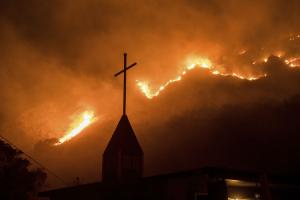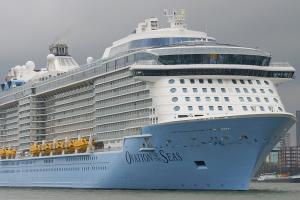
1:10
/
1:37

Calling it "a step to advance the peace process" with Palestinians, President Donald Trump has officially recognised Jerusalem as Israel's capital - an announcement that is expected to spark unrest across the Middle East.
Mr Trump also instructed his State Department to begin the years-long process of moving the American embassy from Tel Aviv to the holy city, even as world leaders condemn the relocation and change in Jerusalem's diplomatic status.
Speaking in the Diplomatic Reception Room of the White House, Mr Trump said the recognition of Jerusalem as Irael's capital was was "nothing more, or less, than a recognition of reality. " He noted that almost all of Israel’s government agencies and parliament are in Jerusalem, rather than Tel Aviv, where the US and other countries maintain embassies.
- READ MORE
"Israel is a sovereign nation with the right like every other sovereign nation to determine its own capital," the President said. But despite widespread belief by experts and leaders that the change in designation could fan the flames in the Israel-Palestinian conflict, Mr Trump has taken a different view.
"I've judged this course of action to be in the best interests of the United States of America and the pursuit of peace between Israel and the Palestinians," Mr Trump said. "This is a long-overdue step to advance the peace process and to work towards a lasting agreement."
The President's announcement was preceded by a day of calls to Middle East leaders to discuss his decision. Palestinian President Mahmoud Abbas warned the US leader that moving the embassy to Jerusalem would have “dangerous consequences” – adding his name to a growing list of nations decrying the move, including Egypt, Turkey, Jordan, Iraq and Saudi Arabia.
Turkey’s President Recep Tayyip Erdogan has gone as far as saying that the issue of naming Jerusalem as the capital is a “red line for Muslims”.
By changing Jerusalem's diplomatic status and the US's embassy location, Mr Trump is breaking with decades of US foreign policy.
While Congress in 1995 adopted the Jerusalem Embassy Act, urging the federal government to relocate the American embassy in Israel to the holy city, every president since then - including Mr Trump - has signed waivers delaying that move. Each waiver postpones the relocation for six months.
"Presidents issued these waivers under the belief that delaying the recognition of Jerusalem would advance the cause of peace," Mr Trump said. "Some say they lacked courage, but they made their best judgments based on facts as they understood them at the time. Nevertheless, the record is in."
Donald Trump's international Presidential trips
He continued: "After more than two decades of waivers, we are no closer to a lasting peace agreement between Israel and the Palestinians. It would be folly to assume that repeating the exact same formula would now produce a different or better result."
Mr Trump reaffirmed his administration's commitment to a peace initiative in the region, saying that the US "would support a two-state solution if agreed to by both sides", Mr Trump said.
"This decision is not intended, in any way, to reflect a departure from our strong commitment to facilitate a lasting peace agreement," he said. "We want an agreement that is a great deal for the Israelis and a great deal for the Palestinians. We are not taking a position of any final status issues, including the specific boundaries of the Israeli sovereignty in Jerusalem, or the resolution of contested borders. Those questions are up to the parties involved."
“The real question I have is if this statement is part of an opening or prelude to the Trump administration’s peace initiative - the one Kushner has been working on for the past several months,” Mr Waxman said.
Mr Waxman said there are “very worrying signs” that the peace initiative will consist of an attempt to impose some kind of peace plan on the Palestinians - one in which they would be pressured to give up their claim to east Jerusalem.
“I don’t think the Palestinians will accept it - but this might be where [the Trump administration] is going,” Mr Waxman said.
Many experts have questioned the timing of Mr Trump's announcement and his reasoning behind the decisions pertaining to the holy city, given that he is "walking into a minefield", said Dov Waxman, a professor of political science, Israel studies and international affairs at Northeastern University in Boston.
Jerusalem is the most sensitive piece of real estate in the world, and is home to important holy sites for three major religions - Christianity, Judaism and Islam.
In an interview with The Independent, Mr Waxman said a declaration by Mr Trump that final borders or boundaries in Jerusalem would need to be determined in future negotiations could lessen the impact of his announcement - although there are still likely to be protests.
As a way to appeal to evangelical Christian voters, Mr Trump had promised during his campaign that he would relocate the US embassy to the holy city - but Mr Trump has already made several moves as President to please this group, the professor added.
- More about:
- Donald Trump
- Jerusalem






No comments:
Post a Comment